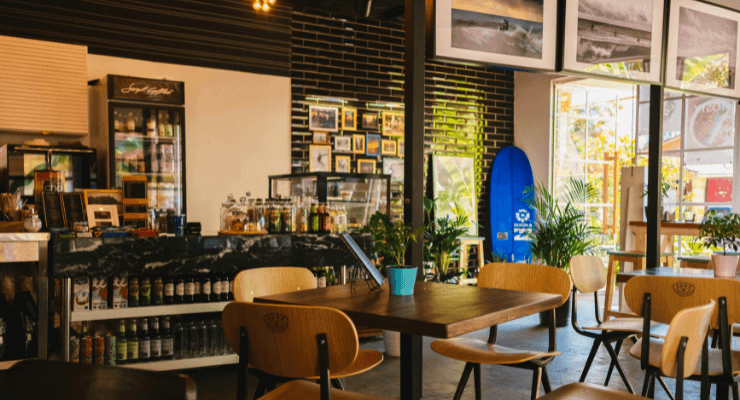
Introduction
Coffee shops have enchanted us not just as places to grab a quick caffeine fix but as social sanctuaries where relationships blossom, creativity flourishes, and communities come together. With their growing popularity, each coffee shop strives to offer something unique, creating an identity that attracts and retains loyal customers. This blog post explores the numerous elements that set a coffee shop apart from its competitors.
Atmosphere and Ambiance
Significance of Interior Design and Decoration.
The interior design and decor are the first things that grab your attention when you step into a coffee shop. Whether it’s rustic wooden tables, modern minimalist themes, or eclectic art pieces, the design sets the tone for your experience. Carefully selected decor enhances the visual appeal while also fostering a comfortable and welcoming environment.
Role of Music and Lighting
Music and lighting play critical roles in shaping the ambiance of a coffee shop. Soft, mellow tunes combined with warm, ambient lighting can transform a simple visit into a soothing, relaxing experience. Conversely, upbeat music and bright lights might energize the atmosphere, making it perfect for productivity and social interaction.
Impact of Seating Arrangements on Customer Experience
Seating arrangements can significantly affect customer satisfaction. Cozy nooks for solitary readers, communal tables for group discussions, and bar seating for quick visits offer varied experiences tailored to different needs. Flexibility in seating options can make a coffee shop more accommodating and versatile.
Quality of Coffee
Significance of Sourcing High-Quality Beans
The fundamental element of any coffee shop is undeniably the coffee itself. Sourcing high-quality beans is crucial for delivering exceptional taste and aroma. Specialty coffee shops often go the extra mile to source beans from specific regions known for their unique flavor profiles, ensuring a superior cup of coffee every time.
The Role of Skilled Baristas in Crafting the Perfect Cup
Behind every great cup of coffee is a skilled barista. Their expertise in brewing methods, latte art, and coffee knowledge adds a personal touch to each order. Baristas who are passionate about their craft can elevate the coffee experience, making it memorable and unique.
Variety of Coffee Options and Brewing Methods
Offering a diverse menu of coffee options and brewing methods—such as pour-over, espresso, cold brew, and siphon—caters to different tastes and preferences. The variety not only showcases the shop’s expertise but also invites customers to explore and discover new favorites.
Menu Offerings
Unique Food and Beverage Options Beyond Coffee
A well-rounded coffee shop menu includes more than just coffee. Unique food and beverage offerings like gourmet sandwiches, artisanal pastries, and specialty teas can set a shop apart. These items add value to the overall experience, encouraging longer stays and repeat visits.
Emphasis on Local, Organic, and Specialty Items
Coffee shops that emphasize local, organic, and specialty menu items demonstrate a commitment to quality and sustainability. Procuring ingredients from nearby farms and markets not only bolsters the local economy but also guarantees fresher, superior-quality products.
Availability of Vegan and Gluten-Free Options
In today’s health-conscious society, offering vegan and gluten-free options is more than a trend—it’s a necessity. Providing diverse dietary choices ensures inclusivity, allowing more customers to enjoy what the shop has to offer.
Customer Service
Significance of Courteous and Informed Personnel
Outstanding customer service is the cornerstone of every successful coffee shop. Friendly, knowledgeable staff can make every visit enjoyable and stress-free. Their ability to provide personalized recommendations and remember regular customers’ preferences adds a unique touch that fosters loyalty.
Personalized Customer Interactions and Service
Tailored interactions, like greeting customers by their name or recalling their regular order, foster a feeling of community. This level of service elevates a straightforward transaction into a memorable experience, ensuring customers feel acknowledged and valued.
Creating a Welcoming and Inclusive Environment
A welcoming and inclusive environment is essential for attracting a diverse customer base. Coffee shops that prioritize inclusivity make everyone feel comfortable and welcome, regardless of background or lifestyle.
Community and Culture
Role of Coffee Shops as Social Hubs
Cafés frequently act as community centers where individuals come together to work, study, or connect with others. The sense of community these spaces foster can be a significant draw for customers seeking connection and camaraderie.
Hosting Local Events and Supporting Artists
Hosting local events, such as open mic nights, art exhibitions, or book readings, can enrich the cultural landscape of a coffee shop. By supporting local artists and creators, the shop not only stands out but also fosters stronger community connections.
Building a Sense of Community Among Regulars
Regular customers often form the backbone of a coffee shop’s clientele. Building a sense of community among these patrons can create a loyal, supportive customer base that feels like an extended family.
Location and Accessibility
The Impact of Location on Customer Foot Traffic
The success of a coffee shop is heavily influenced by its location. Retail establishments located in lively areas with significant pedestrian activity tend to draw a constant flow of patrons. Proximity to offices, schools, and residential areas can also influence customer demographics and preferences.
Consideration of Accessibility for All Customers
Making the shop accessible is crucial to ensure that all customers, including those with disabilities, can enjoy its offerings. Features like ramps, accessible restrooms, and ample seating space make the coffee shop inclusive and welcoming to everyone.
Proximity to Local Attractions and Public Transport
Being near local attractions and public transport hubs can make a coffee shop more convenient and appealing. Easy access encourages spontaneous visits from tourists and locals alike, contributing to the shop’s overall popularity.
Sustainability Practices
Use of Eco-Friendly Materials and Practices
Sustainability is increasingly important to today’s customers. Coffee shops that use eco-friendly materials—such as biodegradable cups and utensils—and adopt sustainable practices—like composting and energy-efficient appliances—demonstrate a commitment to environmental responsibility.
Commitment to Reducing Waste and Promoting Recycling
Efforts to reduce waste and promote recycling can resonate with environmentally conscious customers. Initiatives like offering discounts for reusable cups or partnering with recycling programs highlight the shop’s dedication to sustainability.
Support for Fair Trade and Ethical Sourcing
Supporting fair trade and ethical sourcing ensures that the coffee beans are grown and harvested under fair conditions. This not only guarantees quality but also aligns the shop with ethical standards that customers can feel good about supporting.
Conclusion
In conclusion, what makes a coffee shop unique is a combination of factors that collectively create an exceptional experience. From atmosphere and ambiance to quality coffee, diverse menu offerings, outstanding customer service, community involvement, prime location, and sustainable practices, each element plays a vital role. As coffee shops continue to transform, they evolve into more than mere venues for enjoying coffee—they become essential facets of our daily lives and community connections.
So next time you’re on the hunt for a new favorite spot, remember to look beyond the coffee cup. Experience the ambiance, relish the distinctive culinary delights, interact with the staff, and soak in the local culture. You might just find a coffee shop that feels like home.
FAQ
Q1: What factors contribute to the uniqueness of a coffee shop?
A1: Several factors contribute to a coffee shop’s uniqueness, including its ambiance, menu offerings, customer service, location, and overall brand identity. The unique mix of these elements results in an experience that can distinguish one coffee shop from another.
Q2: How important is the ambiance of a coffee shop?
A2: Ambiance is crucial in defining a coffee shop’s uniqueness. Elements such as decor, lighting, seating arrangement, and even background music play significant roles in creating a welcoming and comfortable atmosphere that can attract and retain customers.
Q3: Can menu offerings make a coffee shop unique?
A3: Absolutely. A diverse and innovative menu featuring unique coffee blends, specialty drinks, and freshly prepared food items can make a coffee shop stand out. Offering locally sourced ingredients and catering to various dietary preferences can also enhance a shop’s appeal.
Q4: How does customer service impact a coffee shop’s uniqueness?
A4: Exceptional customer service can significantly contribute to a coffee shop’s distinction. Friendly, knowledgeable, and attentive staff can create a memorable experience for customers, encouraging repeat visits and fostering a loyal customer base.
Q5: Why is location a factor in a coffee shop’s uniqueness?
A5: The location of a coffee shop can impact its uniqueness by influencing the type of clientele it attracts and its accessibility. A well-situated coffee shop in a bustling urban area, scenic spot, or within a cultural hub can draw diverse patrons and become a local favorite.
Q6: How does a coffee shop establish its brand identity?
A6: A coffee shop builds its brand identity by maintaining consistent branding elements, including its logo, color palette, and marketing tactics. Additionally, the shop’s mission, values, and community involvement contribute to creating a recognizable and respected brand.
Q7: Can community involvement enhance a coffee shop’s uniqueness?
A7: Yes, community involvement can enhance a coffee shop’s uniqueness by fostering a sense of local connection and support. Hosting events, collaborating with local artists, and participating in community initiatives can strengthen the shop’s ties to the area and attract customers who value local engagement.
As an Amazon Associate, I earn from qualifying purchases.



